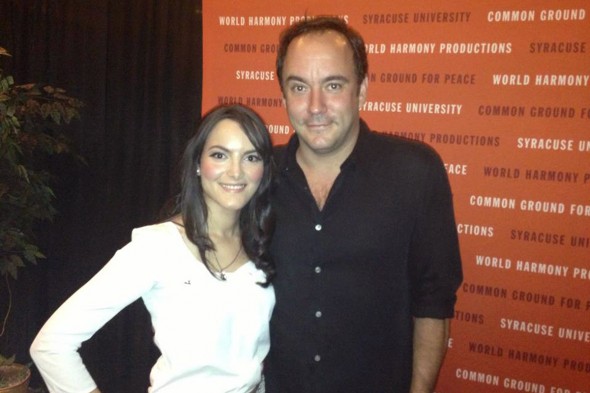Speaking the universal language of music

Doctoral student Nidal Ibourk performed with Dave Matthews and other well-known musicians at an international peace concert in October.
Singer Nidal Ibourk has traveled across the globe performing Arabic music and accompanied A-list musicians such as Roberta Flack, Dave Matthews, Cyndi Lauper and David Crosby.
At an international Global Peace Concert in October, she even performed for the Dalai Lama.
“I think of music is my way of expression,” said Ibourk, a doctoral student in linguistics and international education.
Born in Morocco, Ibourk moved to the United States to attend Kent State on a full scholarship, graduating with a degree in communication. She stayed in school, receiving a master’s in training and development and human resources at Northeastern Illinois University.
“Music has always been in my family — no one took it professional like me — but my mother has a very nice voice, so when I grew up it was just music all day,” she said.
“When I moved to the states, that’s when music really became more professional, and I had more opportunities.”
Her doctoral studies in linguistics are tied to her music career, Ibourk said.
“Linguistics and music are related even though you don’t see the relationship very clearly,” she said. “When you’re a musician, music is a universal language and you have to understand the nuances of language.
“I picked UIC because it is one of the best universities in Chicago and it is very diverse — you meet people from all over the world.”
Ibourk represented North Africa in the Global Peace Concert at Syracuse University last fall. She collaborated with artists from around the world through Skype and conference calls before meeting in person for the show.
“I performed with a band with all different musical backgrounds,” Ibourk said. “For instance, I come from a classical background, another guy came from a pop background, one came from a reggae, one from a rock, so we were all combining our different styles.
“The lyrics were in Arabic, the melody was in Arabic, but it was shifting toward a rock style. It was definitely a new style that we were presenting. It was very meaningful to me as a young artist to represent my background, my culture, and be on the stage for my particular region.”
At the concert, Ibourk performed for her largest crowd yet — 25,000 spectators.
“I’ve performed before in different venues, but not as significant as this one,” she said. “It hit me when I got on stage how many people were truly there.”
She describes her style of music as “a combination of rock and Arabic.”
Ibourk has toured around the United States with her mentor, Arabic master composer Simon Shaheen. They’ve performed together at venues such as the World Institute in New York, MGM Las Vegas and the San Diego Performing Arts Center.
“The message of his tours is to introduce American audiences to Arabic music,” Ibourk said.
“From our tours and interactions with the audiences, they really seem to like it. It’s a new experience to people, but they can relate to the sound and get attached to it, it’s more of an intercultural experience, which is our goal.”
View Ibourk’s performances online.
grusse2@uic.edu
• Gina Russell is a sophomore in communication and a UIC News intern.
Categories
